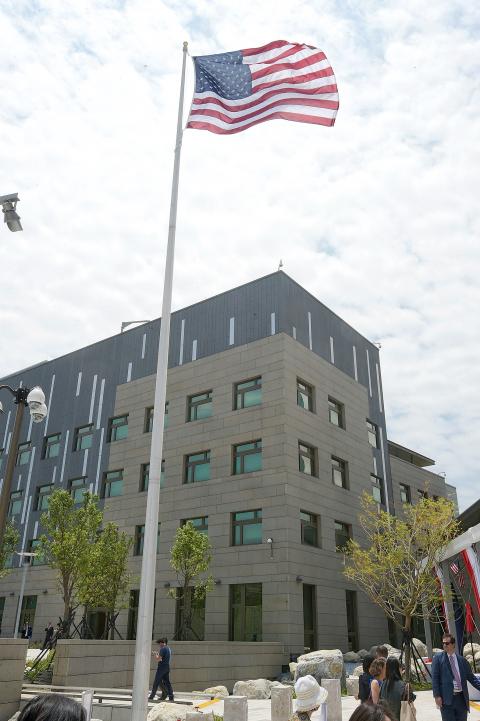The US Department of State has requested that US Marines be sent to Taiwan to guard the American Institute in Taiwan (AIT), according to a CNN report published online yesterday, citing two US officials.
“One US official said that while the request for a Marine security guard was received several weeks ago, it has not yet been formally approved and coordination about its deployment is ongoing between the State Department’s Diplomatic Security Service and the Marines,” CNN reported.
“If the request is granted, it will be the first time in nearly 40 years that US Marines will be guarding a diplomatic post in Taiwan,” CNN said, adding that a department spokesperson would not say whether the request has been made.

Photo: Chang Chia-ming, Taipei Times
Marines are posted at US overseas missions around the world to protect the diplomatic facilities and personnel stationed there. A “marine house” is usually built to accommodate them.
Since Taipei and Washington severed diplomatic ties in 1979, no marines stationed at the AIT office, because the US maintains only unofficial ties with Taiwan.
Earlier this month, on the sidelines of the dedication of the AIT’s new office compound in Taipei’s Neihu District (內湖), AIT Director Kin Moy shrugged off media queries about whether the compound would be guarded by marines.
“We do not make political statements with our security. What we do is we bring a sufficient number of people to coordinate with local staff to ensure that the people inside our buildings are very safe,” he said at the time.
At a conference held by Washington-based think tank Global Taiwan Institute in February last year, former AIT director Stephen Young said that the US would post marines at the new AIT compound.

CHAOS: Iranians took to the streets playing celebratory music after reports of Khamenei’s death on Saturday, while mourners also gathered in Tehran yesterday Iranian Supreme Leader Ayatollah Ali Khamenei was killed in a major attack on Iran launched by Israel and the US, throwing the future of the Islamic republic into doubt and raising the risk of regional instability. Iranian state television and the state-run IRNA news agency announced the 86-year-old’s death early yesterday. US President Donald Trump said it gave Iranians their “greatest chance” to “take back” their country. The announcements came after a joint US and Israeli aerial bombardment that targeted Iranian military and governmental sites. Trump said the “heavy and pinpoint bombing” would continue through the week or as long

TRUST: The KMT said it respected the US’ timing and considerations, and hoped it would continue to honor its commitments to helping Taiwan bolster its defenses and deterrence US President Donald Trump is delaying a multibillion-dollar arms sale to Taiwan to ensure his visit to Beijing is successful, a New York Times report said. The weapons sales package has stalled in the US Department of State, the report said, citing US officials it did not identify. The White House has told agencies not to push forward ahead of Trump’s meeting with Chinese President Xi Jinping (習近平), it said. The two last month held a phone call to discuss trade and geopolitical flashpoints ahead of the summit. Xi raised the Taiwan issue and urged the US to handle arms sales to

BIG SPENDERS: Foreign investors bought the most Taiwan equities since 2005, signaling confidence that an AI boom would continue to benefit chipmakers Taiwan Semiconductor Manufacturing Co’s (TSMC, 台積電) market capitalization swelled to US$2 trillion for the first time following a 4.25 percent rally in its American depositary receipts (ADR) overnight, putting the world’s biggest contract chipmaker sixth on the list of the world’s biggest companies by market capitalization, just behind Amazon.com Inc. The site CompaniesMarketcap.com ranked TSMC ahead of Saudi Aramco and Meta Platforms Inc. The Taiwanese company’s ADRs on Tuesday surged to US$385.75 on the New York Stock Exchange, as strong demand for artificial intelligence (AI) applications led to chip supply constraints and boost revenue growth to record-breaking levels. Each TSMC ADR represents

State-run CPC Corp, Taiwan (CPC, 台灣中油) yesterday said that it had confirmed on Saturday night with its liquefied natural gas (LNG) and crude oil suppliers that shipments are proceeding as scheduled and that domestic supplies remain unaffected. The CPC yesterday announced the gasoline and diesel prices will rise by NT$0.2 and NT$0.4 per liter, respectively, starting Monday, citing Middle East tensions and blizzards in the eastern United States. CPC also iterated it has been reducing the proportion of crude oil imports from the Middle East and diversifying its supply sources in the past few years in response to geopolitical risks, expanding